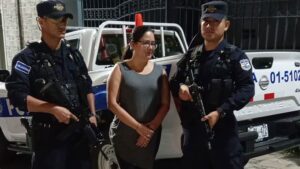A group of 25 civil society organizations from seven Latin American countries (Argentina, Brazil, Colombia, El Salvador, Guatemala, Mexico and Nicaragua) presented a report to the Inter-American Commission on Human Rights (IACHR) on trends in indirect censorship of freedom of expression in the region. At the hearing “Affectations to the right to freedom of expression by state censorship measures in the Americas,” which took place during the 190th period of sessions of the IACHR, the organizations presented their diagnosis and petitions, which have now been compiled in a final report.
The document brings together data, emblematic cases and analyses that point to three central strategies for undermining freedom of expression in these countries: stigmatization against the work of the press, social control through new surveillance technologies and the judicialization of freedom of expression on issues of public interest.
Access the report here.
The organizations identified a similar roadmap applied in different countries to erode democracy by censoring freedom of expression. First, they highlighted the establishment of a parallel official narrative that stigmatizes the work of the press. The systematic use of stigmatizing language by political leaders directly attacks journalists and critical voices against governments, but affects society as a whole.
“It is urgent that the Inter-American system develop concrete standards on the scope of freedom of expression of officials, what their rights and obligations are, and how this impacts State communications in the digital world. This is vital in order to prevent violence derived from stigmatizations disseminated online, which can be understood as enabling messages”, states the report.
Another axis of the report refers to the use of technology to facilitate social control mechanisms through surveillance. To this end, a series of strategies are listed and identified, such as illegal geolocation, cyberpatrolling, the deployment of surveillance and facial recognition technologies, and access to data held by companies.
Finally, the report addresses the judicialization of freedom of expression in matters of public interest, abusing legal tools. Based on cases reported in countries in the region, it highlights strategies of using criminal proceedings, arrests, excessive claims for compensation that often go hand in hand with stigmatization campaigns and can even lead to exile.
The organizations call on the Commission to:
- Call the attention of the States of the region to monitor the situation and reaffirm their commitment to the parameters for the protection of freedom of expression.
- Create a Model Protocol with guidelines for the State on the implications of its digital communication, taking into account the parameters for the protection of freedom of expression, and that works as a measure to prevent online violence and its effect also on offline aggressions.
- Prioritize the cases pending before the Commission on the issues described in the report.
- Publish a report on the methods of surveillance and its effects, taking into account the elements presented in the report.
- And reiterate the request made at a hearing at the 187th session on the abusive judicialization of issues of public interest for a thematic report.
The hearing in which these claims were presented before the IACHR was recorded and can be accessed at this link.
The full final report can be accessed at this link.


